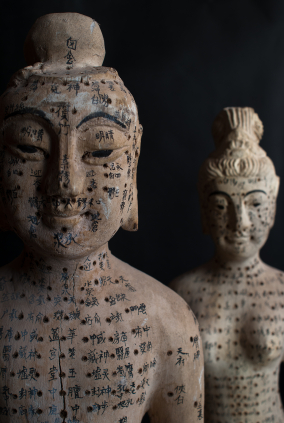Hot flashes, acupuncture and Traditional Chinese Medicine
Acupuncture continues to top the list of ‘go to’ alternatives for hot flashes. And despite confusion, researchers remain focused on trying to explain (and perhaps overcome) conflicting study findings. That, my dear readers, is a very good thing, as this non-invasive, gentle treatment modality, while not the end all to be all, may one day become as accepted among Western practitioners as pharmaceutical agents are.
The goal of Traditional Chinese Medicine (TCM) and acupuncture as they relate to menopausal symptoms like flashes is to reinforce the kidneys, which according to TCM philosophy, result due to a decline in kidney yin and yang (think: out of balance). As I wrote a few years ago:
TCM and other similar philosophies emphasizes various body systems that together, form a network or grid connected by a meridien, if you will, as well as the relationship of the body to its social and natural environment. Its primary focus on maintaining health and enhancing the body’s ability to fight off disease. TCM will not focus, for example, on treating specific pathogens but rather, on addressing non-specific factors that create disturbances or imbalances within a certain network. TCM also examines how these imbalances may occur in unique parts of a specific system, such as the heart and blood vessels and small intestine (all of which are part of the heart system) and how they change over time. Western medicine, on the other hand, focuses primarily on treating morbidities, or symptoms related to various conditions and diseases. You can read more rabout TCM in this post from September, 2010.
In TCM, menopausal symptoms are believed to be related to a decline in yin or yang in the kidneys. One of the oldest prescriptions in TCM to reinforce kidney energy is known as ‘Qing E Fang’ (QEF) and the first record of its use dates back to the year 960. The preparation is a combination of four key ingredients that are mediated through estrogen receptors and expression, hence, its potential usefulness in menopause. (These ingredients, in case you are interested, are Cortex Eucommiae (whose bark and leaf have an antioxidant effect) Fructus Psoraleae (commonly used for bone health and to treat estrogen associated diseases), Semen Juglandis and Rhizoma Garlic.)
From a Western perspective, there is evidence (albeit preliminary) that suggests that acupuncture actually inhibits the thermoregulatory action of the hypothalmic-pituitary gland that works to create a hot flash. (You can read more about how a hot flash comes about here.) And when study trials are designed with TCM and acupuncture philosophy in mind, they tend to yield positive results – such as a small study that appears online in Menopause journal.
This time, researchers took four groups of women who experienced 20 or more hot flashes a week and assigned them to one of four groups: real acupuncture, sham acupuncture (needles inserted superficially), a 14 herb chinese formulation known as Zhi Mu 14 or a placebo version of the same. Women in all four groups were exposed to licensed practitioners and received TCM diagnoses. An important distinction in this research was that not only did the researchers predetermine 8 standard sites for needle insertion, BUT they also allowed the clinician to use an additional, individual points. In the sham acupuncture group, the acupuncture points corresponded to those used regularly in large clinical trials. Women using the Zhi Mu or the placebo took three capsules daily. And, all women maintained a hot flash and menopause symptom diary.
The findings are intriguing. While Zhi Mu did not appear to have much impact on hot flashes, acupuncture did, resulting in significant improvements in both hot flash frequency and severity as well as in other symptoms. Over the long term, acupuncture also appeared to attenuate bladder and sexual problems as well as joint and muscle aches and pains. Moreover, the findings also suggested that real acupuncture is superior to sham acupuncture in reducing severity and frequency of menopausal symptoms, much more so than other clinical trials. Importantly, the researchers believe that their results, albeit preliminary, are due to standardized plus individualized treatment performed by highly experienced acupuncturists.
Where are the holes? Well, this was a small group of women and Zhi Mu doses were not modified according to individual needs (as they might have been in the real world). They also did not test liver values at the end of the study (evidently Zhi Mu has been linked to liver toxicity in some women) so safety of this particular preparation was not properly assessed. Still, scientific jargon aside, this is what you need to take away from this information:
A very small study that was designed by Western practitioners within the parameters of TCM philosophies once again demonstrated the beneficial effect of acupuncture on hot flashes in particular. When acupuncture is conducted appropriately and by a highly skilled practitioner, positive benefits may be realized.
Before we jump to any future conclusions, it’s time to revisit and consider the value of alternatives for menopausal symptoms. Sometimes a spade simply is not a spade and there is more than meets the eye when you start digging through the details.
Read More







